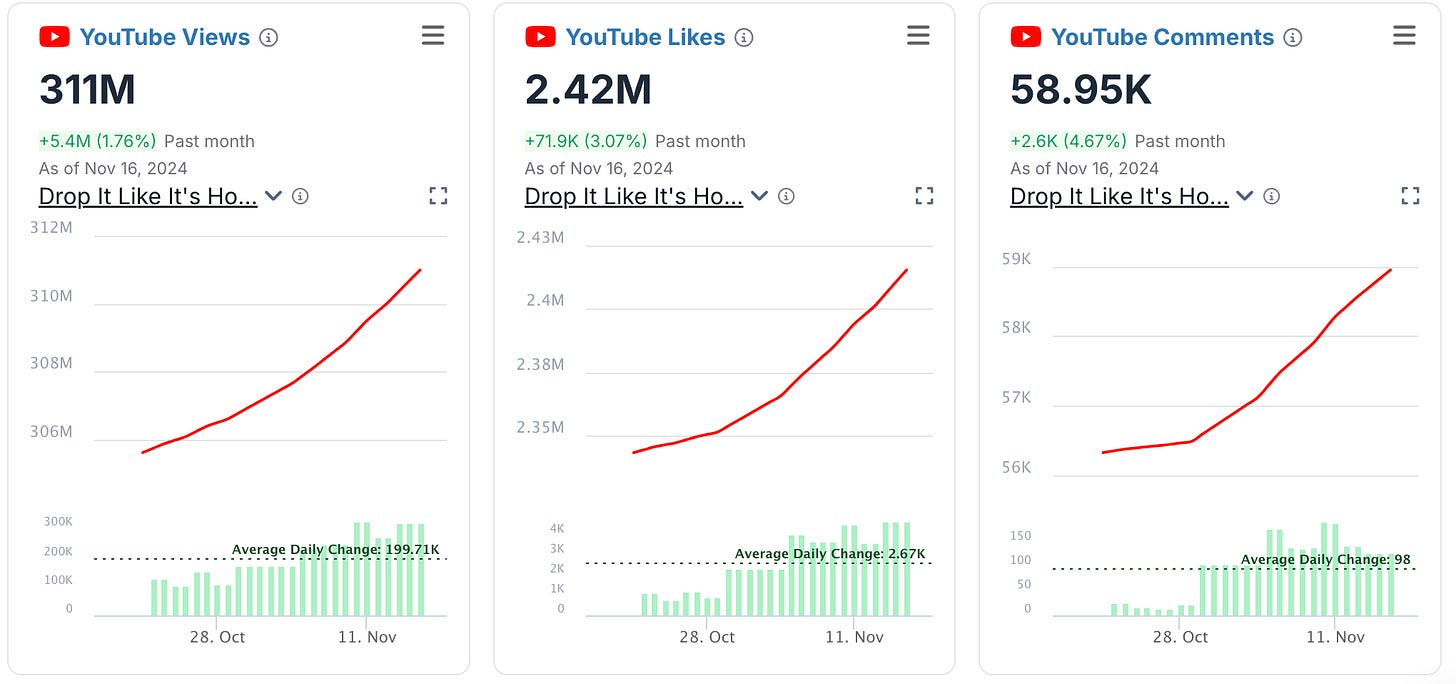How video games can 'Encourage' Music - Fortnite Remix: The Prelude
'Ain't nuthin' like a Fortnite gangsta party' (Dogg, S. 2024)
This festival marked a moment in history where Snoop Dogg, during a live show inside of a billboard in Times Square, literally said 'Thank you Fortnite'. Surreal, isn’t it?
I do try to avoid writing about Fortnite…But, there’s something deeper than a new chapter and a live show that I want to document here, expanding on a recent perspective of ‘expression vs. encouraging’ music within gaming. Fortnite can easily do both, and I’ve got an idea of how it could encourage music discovery and development.
Fortnite Remix: The Prelude - Full Event
NERDY DATA ANALYSIS FOR THE NERDS
Expanding the latest Fortnite event
1. Fortnite Remix: The Prelude - Full Event
On the 1st November 2024, Fortnite hosted a live show and a digital event at the same time. The live show was a takeover of Times Square in New York, where Snoop Dogg and Ice Spice performed from within a billboard. At the same time, Fortnite put on a live event where players can head to a specific location in their main game mode (Battle Royale) and watch the live stream of the Times Square real life performance, in-game. When the event ended, the new chapter begun straight away, including new locations and cosmetics from the featured artists (Snoop Dogg, Ice Spice, Eminem and teasing Juice WRLD)
More than 10 million people watched this live in-game, with many more collectively watching on YouTube as well as in real life.
Overtaking the billboards in Times Square, asking Snoop Dogg and Ice Spice to perform live within them, and organising this at a specific time of day, is no doubt a huge expenditure. My guess is that this would have cost between $1-2 million for just these 15 minutes.
I’m not Rain Man, but I can confidently say there’s probably not 10 million people in this photo of the live event above, unlike the 10 million viewers through Fortnite. The idea of artists of this size playing Times Square specifically for Fortnite feels more like a huge publicity stunt for non-Fortnite fans to win credential, and a serious bragging right over the real-life leverage that Fortnite has.
Before I move onto some data, this whole partnership was curated by Good Game Champ, which is now the gaming arm of the legendary Death Row Records. Snoop Dogg has a long history with Death Row History, and the main man behind Good Game Champ is Cordell Broadus, who is Snoop Dogg’s son. Looks like the pair of them are leaning into gaming applications of music through appls like UEFN which is great to see.
2. NERDY DATA ANALYSIS FOR THE NERDS.
Epic said that artists see an 8.7% lift of consumption on streaming platforms after bringing music into the game. So what impact did this Fortnite inclusion have on music fans?
Let’s focus on Snoop Dogg as the main artist and feature of this event and chapter. Jumping into Chartmetric:
Snoop Dogg’s Spotify monthly listeners went up by 400% the first week of this event.
I then decided to check out one of the tracks that is used during an emote in the game, ‘Drop It Like It’s Hot’. Below you can see an increase in streams of this track which does suggest a conversion from a game inclusion to streaming services.
(Note that there is no effect on airplay spins, suggesting Fortnite inclusion doesn’t translate to this format.)
YouTube is another important platform to consider for this demographic. There was a noticable increase in views, likes and comments across the board since the event.
Few important things to note here. Firstly, Snoop Dogg is already established and has big consistent numbers, so Fortnite’s exposure may not have had a dramatic effect, but its great to see there still is one. We also know that fans on YouTube are talking about Snoop Dogg, and players are listening to Snoop Dogg outside of the game.
However…the biggest find is this:
People discovering this track through shazam has gone up. This proves that players who did not know this song, wanted to know what song this was, with an intention to listen to it again. With 1.1 million daily players, Fortnite can be a place to enjoy established music, as well as discover it.
3. Expanding the latest Fortnite event
In my last Substack, I discussed ‘Expressing’ and ‘Encouraging’ music. The inclusion of Snoop Dogg, Eminem, and Ice Spice in Fortnite's latest event is a clear example of music expression—established artists showcased in an immersive gaming experience. But what about encouraging music discovery?
The update introduced three themed areas and cosmetics tied to these artists, like a minigun that spouts the lyrics of "Godzilla." While this is very cool, there’s untapped potential in smaller, organic updates that mirror ‘playlisting’—a high-turnover, less curated approach to exposing players to new music. (Yes I’ve seen ‘Soundwave’)
If Fortnite wants to position itself as the global stage for music in gaming, why not embrace a festival-like model? Big events can coexist with smaller, unadvertised performances in various in-game venues in creative ways. Imagine random in-game mini events that introduce emerging artists alongside dynamically altering gameplay—creating an evolving and consistent connection between music and the gaming experience.
I'll give an example of this - I’ve been listening to way too much Jane Remover recently. This hyperpop sound could inspire a Fortnite venue where glitchy, Dariacore-inspired gameplay changes gravity or visuals as tracks shift. A single, reusable zone featuring emerging artists with simple cosmetic and gameplay tweaks could minimize development while driving music discovery.
For Epic, this is a long-term asset. Fortnite already boosts Spotify streams, YouTube views, and Shazams for featured artists. Translating this to emerging talent could foster grassroots cultural moments, building Fortnite’s reputation as a hub for shaping digital culture ‘bottom up’. Scarcity and spontaneity create intrigue, encouraging players to engage deeply with both the game and the music.
Despite limiting exposure, scarcity/secrecy is an effective in its own way - I’ve discussed how it creates a cult like following that can transcend above the game. Fortnite’s ability to boost music metrics for established artists raises the question: how might this translate for emerging talent, where player-driven interactions could shape future success? I’m here for it.
Finally, we are yet to see what Fortnite does with the storyline, because so far these artists have arrived in-game without any storyline ties (…yet?). If artists have a solid and consistent placement in the ongoing Fortnite lore, I don’t see why emerging artists that are ‘selected’ by player engagement could join the narrative. Is this a brand new style of A&R?
TLDR
Fortnite put on a live show featuring Snoop Dogg and Ice Spice in Times square, broadcasting in-game as an in-game event. Spotify & Youtube streams increased, and people were discovering the song through Shazam.
Fortnite could offer emerging artists valuable exposure while positioning itself as a hub for music discovery. Win-win.











